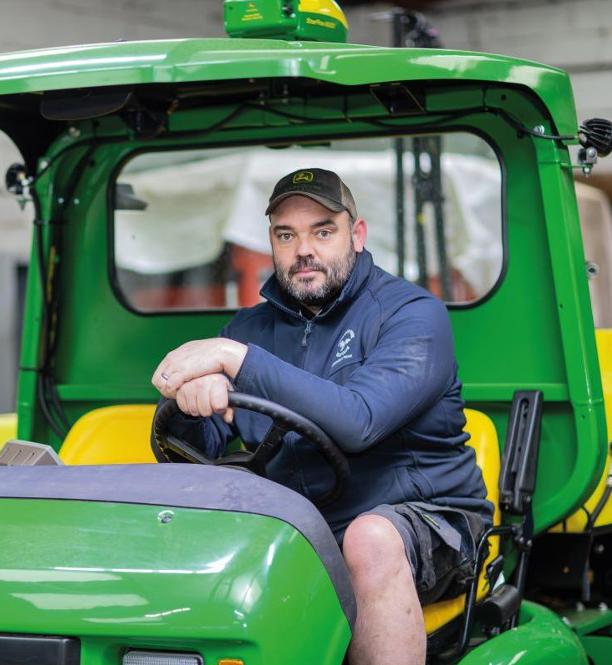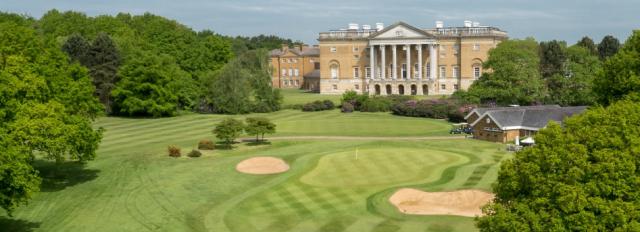A Day In The Life Of David Byron, Head Greenkeeper at Thorndon Park Golf Club
Maintaining one of Essex’s most picturesque courses is no small task. As Head Greenkeeper, David Byron leads a skilled team that balances science, timing, and intuition to deliver exceptional playing surfaces in every season. From managing turf health to planning maintenance schedules, his role ensures that members and visitors alike experience Thorndon Park at its absolute best.
What time do you arrive at the club and what is your morning routine?
I live on site so I’m actually always here! I tend to walk the course in the evening with my dog to note any jobs that might need doing the following day. Every morning, I’ll meet with my deputy Tony and then he briefs the team on the day’s jobs. Mondays are a little different as we try to plan the whole week around the club dia0072y.
How many people are there in your team and do you share tasks?
I live on site so I’m actually always here! I tend to walk the course in the evening with There are currently 10 of us in total and everybody can do any job except for spraying, which is shared between three of them.
How do you collaborate with your colleagues?
Motivation is like fuel - it runs out and, often, motivation on its own isn’t enough… We find it better to set clear expectations, consistent accountability, good training and resources, autonomy and responsibility to give everyone a sense of trust. We also provide regular feedback and celebrate all of the ‘wins’. This makes the team feel valued all the time. In addition, we have a couple of BBQ’s during the year after busy periods and something as simple as ice creams go a long way in the warmer weather!
What aspects of your job give you the greatest satisfaction?
Bringing in new people and seeing the team thrive and do well, especially when they move on and build successful careers for themselves.

And the least satisfaction?
Budgeting! I never enjoy writing a budget.
Have you attended any courses recently, and if so, what did you take away?
I recently attended an online course with Kevin Fish CCM which has proven very useful. Listening to his experience as a highly regarded Club Manager helped me understand myself a little better, how I work, which has in turn helped me to become a better manager.
What is your favourite season of the year and why?
My favourite is autumn because the course colours are amazing and we can get our teeth into some good projects!
Are you witnessing evidence of climate change and, if so, how has your job had to adapt to changing weather patterns?
We are definitely seeing the effects of climate change now - the only consistency is the inconsistency! Very much feast and famine with the weather. The hot dry spells mean we have to be very careful with our water resources and, because of that, we’re making plans to secure a more sustainable water supply. Water is going to be the biggest challenge for golf courses going forward.
Have you had to overcome any course issues with disease and/or pests?
Not so much with disease but we were the victims of some significant vandalism by quad bikes back in January. This was a monumental effort to put right but the team really pulled together and we got the surfaces turned around relatively quickly.
What seed mixtures and/or cultivars do you use for your greens, tees, fairways and roughs?
We mainly use seed from the Johnsons range on all of our surfaces. We use Johnsons J Premier Tee on the tees and have used the J All Bent mix on our greens for a number of years with great results. We have just started using J Ultrafine Rye 50 on our fairways as we look to reintroduce fescue back into the surfaces after a few seasons of seeding dwarf rye.
With a growing focus on sustainability, do you deploy any sustainable practices in the management of your course?
We have moved away from a lot of chemicals and take a more organic approach focusing on the soil. We have also started to switch to more electric and hybrid machinery, and try to reuse as many materials and resources for other projects as we can.
What do you do to support wildlife?
We grow up long rough and have ‘no mow’ areas on sections of the course that are well out of play. We also have beehives on site and we like to create log piles, where we can, for insects.
What are the technological developments that you feel have been the most important in your career to date?
GPS for spraying, hybrid mowers and the technology being utilised in the products we use. Thanks to these advancements we can get away with making fewer inputs, and using less product overall.

Do you use social media professionally and what do you think this contributes to the industry?
We do use social media and it can be a great tool, but it’s a bit of a double-edged sword as it’s easy to draw comparisons which can cause issues. I think as long as your careful, showcase what you do in a positive way and avoid being drawn into negative situations, it can be a good thing to show the world what greenkeeping is all about!
How would you improve the greenkeeping industry?
People need to understand it’s a skilled trade, so promoting it in this way will really help. We need to shout more about the positives of our industry and move away from always focusing on the negatives. Too much emphasis is put on pay and working hours and not about the many benefits!
What advice would you give to a young greenkeeper starting out today?
Learn everything you can about technology - GPS systems, autonomous mowing etc. There’s no doubt this is where the industry is heading, so becoming more technically proficient will help with enjoying a long-term career.
How do you spend your leisure time?
I spend my free time tinkering on my vintage Volkswagens, building Lego, walking my dog and spending time with my friends and family.